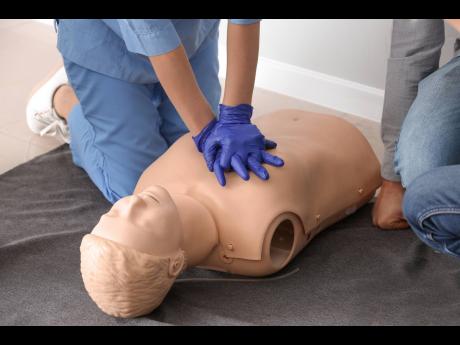More Jamaicans urged to learn CPR
Deborah Chen, executive director of the Jamaica Heart Foundation, is urging more Jamaicans to learn cardiopulmonary resuscitation (CPR).
"People aren't availing themselves of the courses as we would like to see. I think people do know about CPR, but to translate the knowledge into them actually going and doing a course with the Heart Foundation of Jamaica, or one of the other agencies, is where the issue lies," she said. This lack of training could mean the difference between life and death. Cardiologist Dr Mark Hoo Sang explained that the moments immediately following a cardiac arrest are critical, and bystander intervention is often the key to survival.
"Many people experience cardiac arrest in public spaces, and the most likely way for them to survive is to have CPR started immediately when they collapse," Dr Hoo Sang said. "If you have to wait for an ambulance in Jamaica, which doesn't have the kind of emergency response system you find in more developed countries, you lose time -- time that could save a life."
"In some countries, you can call 911 and get paramedics on the scene in 10 minutes. Even 10 minutes can be too long, but it's something. In Jamaica, if you collapse and no one knows CPR, that might be it," he added. Without oxygen, the brain begins to suffer irreversible damage within minutes. CPR, which includes chest compressions, can restore limited blood flow.
"If bystanders can administer CPR, they can double or even triple the chances of survival," Dr Hoo Sang emphasised. Yet, according to Chen, interest in CPR training is often reactive, not proactive.
"Usually, when we see an increase in people wanting to do the courses, it's after something unfortunate happens, like a drowning or electrocution. Sometimes it's when a close family member might have died," she said. Chen opined that misconceptions about CPR also play a role in the lack of urgency for persons to learn it.
"Some people are hesitant because they don't want to do mouth-to-mouth resuscitation, which is part of the course. Others worry about the time or cost, but what is the cost of a life?" she asked. Chen is therefore advocating for workplaces and communities to prioritise CPR training.
"You could be at home this evening and a child swallows something they shouldn't. Or you're at work and someone collapses. What would you do?" she asked. "By the time help arrives, you could have already started CPR or applied first aid. These skills could save a life."
"We hope that with more public awareness campaigns, like CPR Week in August, more people will understand how vital this training is," Chen added.






































